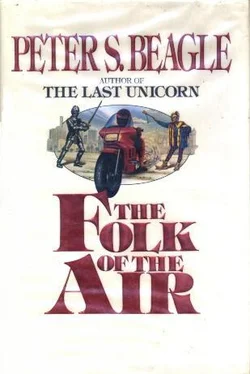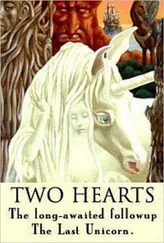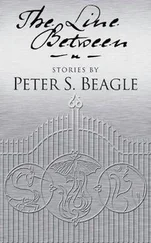Grant finally thumped into the pool and began to swim—heaving himself along in a chugging, high-prowed breast stroke—and Ben beckoned sharply to Farrell. They dressed almost without speaking, though once Farrell asked, “What’s Grant teach?”
Ben said, “Art history,” never looking at him. In the yellow-green light of the caged bulbs, the fragile scar boiled up maroon.
During the steep, silent ride home, Farrell tilted the bucket seat back, stretched his legs out, closed his eyes and hummed I Belong to Glasgow . Ben finally sighed angrily and said, “It’s like a running gag with Grant. We met at a costume party a couple of years ago. I went as a Viking skald, and Grant was a sort of Jacobite exile, all sporrans and haggis and the Skye Boat Song , the complete homemade Highlander. He’s been doing it forever, since long before I got here. Rack of old swords in the office, and he walks around campus reciting laments for Falkirk and Flodden Field to himself. They say he’s really impressive at committee meetings.”
“All those other people he was talking about,” Farrell said. “Sounded like mail call in Sherwood Forest.”
Ben glanced sideways as the car took one of the Avicenna hills’ Russian-roulette corners. There were few street lights here, and the car was crowded with the prickly, fragrant shadows of jasmine, clematis, and acacia. “I told you, he’s like that most of the time. It used to turn off for his classes, but I hear it’s even getting into the lectures now. He’s got his own names for everybody, and when he’s talking faculty politics, you’re just supposed to know who he means. That’s what all that stuff was about, the king and the war and whatever.” He grinned then. “I will say, it does lend a certain grandeur to fights over who has to teach the freshmen this semester. Makes it all seem like the Crusades, instead of mud-wrestling.”
“He called you Egil something,” Farrell said. Ben nodded, rubbing his mouth. “Egil Eyvindsson. It’s the name I used at the party. Egil was the greatest of the Icelandic skalds, and there was another man around the same time called Eyvind the Plagiarist. Professors at play.”
They had parked in the driveway before either of them spoke again. Ben cut the engine and they sat still, looking up at the wishbone-sharp gables and the pagoda flare of the porch roof. Farrell asked idly, “How many windows on this side of the house?”
“What? I don’t know. Nine, ten.”
“That was yesterday,” Farrell said. “Nine windows yesterday, eleven tonight. They never come out the same way twice.”
Ben stared at him for a moment, then turned away to study the house again. Farrell said, “There are usually more of them at night. I’m not sure why that is.”
“Eleven,” Ben said. “Eleven windows, counting that halfsort of thing in the pantry.” He smiled at Farrell, opening the car door. He said, “At my house, when we were kids. You remember how many times you fell down those last few stairs into the basement? All those years, and you never could keep track, you just kept stepping right off into space. Eleven windows, Joe.”
He was halfway to the house before Farrell had even gotten out of the car. The front door opened for him, though no one was standing there. Farrell called loudly, following him, “They move around a little, too. Just a bit, but it’s unsettling.” Ben went on into the house without turning. The warm yellow light curled around him and lapped him up and swallowed him.
He told Sia a bout Crawford Grant a few evenings later, while he was practicing. Ben was away at a meeting of the faculty senate. She sat in a chair with an old newspaper in her lap, carving a block of some dark wood into the shape of a woman. “I have heard of him,” she said. “He sounds like half my clients—they just know they would surely have been happy in some other time, some other civilization. They play endlessly with the stars, the Tarot, the ouija board, to find their real home. Play that one I like again.”
Farrell retuned the lute and struck into the Le Roy galliard that was her current favorite. He loved practicing in the living room; the high ceiling did not dilute the sound, nor the small rugs absorb it, and the notes came out as hard and light as arrowheads. Sia said, “The displaced ones, they are mostly who come to see me. You can be uprooted from imaginary places too, you know.”
The galliard, being played too fast, lost its center of gravity and flapped for balance like a child running downhill. Farrell started over. Sia did not look up from her work, but Farrell was coming to believe that her senses were not as stationary and specialized as those of other people. Her living hair watched his hands moving on the lute, if her head was bent away from him; he suspected that the brown, surprisingly delicate wrist that drove the X-Acto knife over wood as if she were caressing a child would have done as well. Thinking about that, he let the Le Roy drift to pieces again and irritably slapped the lute silent.
When she raised her head, he expected her to ask if she were distracting him; but she said only, “There is something wrong with your music.”
“I missed practicing last night. You lay off even a day with this kind of tune, and it shows right away.”
Sia shook her head. “I didn’t mean that. Your music is beautiful, but it has no place , it belongs nowhere.” Farrell could feel his face stiffening and flushing even before she said, “Your music is like you, Joe.”
He made a joke of it. He said, “Well, lute music belongs wherever the acoustics are good. I always keep that in mind as I go along.”
She bowed over the carving again, but she was smiling, showing her neat white teeth with the little spaces in between. “Yes,” she said, “yes, you are a master at living in other people’s houses.” Farrell had been trying to float the galliard off the rocks; now he stopped playing for a third time. Sia said, “It is not such a bad thing. It is really quite lovely to see, like a hermit crab fitting himself into an empty shell. You can match yourself to any surrounding.”
“That’s chameleons,” Farrell said. He fussed with the lute, running a cloth under the strings to dust the fingerboard, squinting as he checked the tied gut frets. The lute whispered in his hands, answering his anger.
Sia began to laugh. “But you are so good about it all.” The knife never stopped its bright stroking. “The way you play in the evenings, every night, after you have washed the dishes. We would have to break your arms to keep you from doing the dishes. And the way you always bring home something extra on Thursday or Friday—wine, ice cream, cheese, pâté. Never cherries, not since the first time when I said they made my mouth hurt. You remember everything like that.”
He stood up, but she made him sit again by moving her head. She said, “Oh, Joe, I don’t mean to confuse you. There is nothing gone wrong with your radar; you are still perfectly welcome here for as long as you like.” She had stopped laughing, but amusement continued to illuminate her voice, setting the words winking at each other. “You are good for Ben, and I like you; and in three weeks I am already in the habit of your little gifts and your music every evening. In another week you will have become indispensable.”
Farrell said, “I should have a place by the middle of the month. There’s a man supposed to call me at work tomorrow.” There came a knocking, heavy and slow; it had a dull power behind it that made the whole house jar and ache. Sia went to the door.
The carving was of a woman growing on a tree like some lovely gall. She was free of the trunk from shoulders to thighs, and one knee was bent so that only her toes touched the tree; but her hair had just begun to emerge, and her hands still trailed in the wood to the wrists. Farrell fancied that he could see them, bending away as if they were shining through water. The woman had no eyes.
Читать дальше












